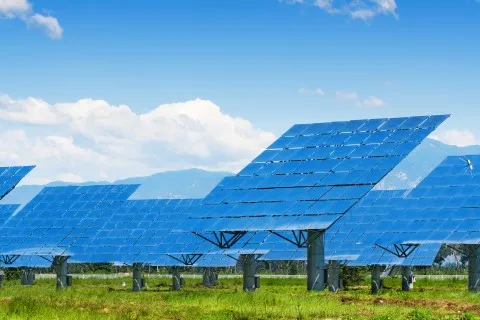
Vietnam unveils first draft of solar power purchase agreeement
Analysts say some issues are still unresolved and may affect projects' bankability.
Following the Prime Minister's issuance of Decision No. 11 adopting the new policy for solar power, the Ministry of Industry and Trade of Vietnam (MOIT) has released the first draft of a Circular (Draft Circular) providing for detailed guidelines on the development of solar power projects in Vietnam, according to Baker McKenzie.
The Draft Circular includes a draft solar power purchase agreement template (Draft PPA), as well as detailed guidelines on the formulation and approval of national and provincial solar power development plans.
However, Baker McKenzie says the Draft Circular leaves certain key issues unresolved, which may have an impact on the bankability of solar projects, especially for large utility-scale solar power plants.
Here's more from Baker McKenzie:
The Draft PPA reinstates Decision No. 11's approved Feed-in-Tariff (FiT) rate of VND2,086 per kWh (equivalent to USD cents 9.35 per kWh, exclusive of VAT) for grid-connected projects. For rooftop projects, this FiT rate applies only to the excess power generated as compared with power consumed during the relevant year. Though the price is converted in USD based on a current exchange rate, the Draft PPA does not include any indexation of the FiT by way of escalation in accordance with the Consumer Price Index (CPI) or the exchange rate, or any other provision to address inflation risks.
Under Decision No. 11 and also the Draft PPA, Vietnam Electricity (EVN), as the State-owned utility, is delegated to purchase all electricity generated from solar power projects. Under the Draft PPA, EVN as the purchaser is given the rights to stop purchasing electricity in certain circumstances beyond the reasonable control of the seller, without any compensation or payments to the seller/project developer.
Specifically, the Draft PPA specifies that the purchaser is not required to purchase or take electricity in, among others, any of the following scenarios:
During the time when the purchaser installs equipment, or it repairs, replaces, inspects or examines the grid directly related to its connection to the seller's power plant;
when the transmission grid or the distribution grid connected to the purchaser’s grid has a problem or grid equipment directly connected to the purchaser's transmission grid or the distribution grid has a problem; and when the purchaser’s grid needs support to recover after the incident in accordance with the provisions of operation of the national power system and the standards, technical regulations of the electric industry.In addition, under the Draft PPA, the purchaser is obligated to make payments to the seller only for the electricity that the purchaser has received. There is no concept of deemed commissioning to allow for the payments if the facility or a section is ready but EVN fails to construct grid connection or is otherwise unable to take the electricity produced.
Under the Draft PPA, in the event of termination due to the purchaser's default, the termination payment amount will be limited to the value of the seller's actually generated electricity output during he past one (1) year until the time of the termination of the PPA. No termination payment by way of compensation by EVN as the purchaser is provided to recover for the project company / seller's outstanding debts, as well as expected return on equity capital.
The Draft PPA provides that upon termination of the PPA, the non-defaulting party can make a claim to the defaulting party for compensation of direct and actual damages. The non-defaulting party must prove any such damages caused by the defaulting party and any direct benefits that the non-defaulting party would have been entitled to in cases where there is no such default by the defaulting party. Other than that, there is no termination payment or protection for outstanding debts of the project company in the event of the project company/seller's default.
The Draft PPA provides and allows for EVN to bring disputes to Vietnamese courts for litigation and other State energy authorities of Vietnam for mediation or resolution.
Specifically, the Draft PPA details the procedure for resolution of disputes over the PPA as follows.
In case of a dispute between the parties to the PPA, the party who raises a dispute must notify the other party in writing of the dispute and its demands.
The parties will negotiate to settle the dispute within sixty (60) days from the date of receipt of the notice of the party who raises the dispute.
The dispute resolution process related to the payment of electricity shall be conducted within fifteen (15) days from the date of receipt of a notice of the claiming party.
If the parties fail to reach an agreement, the parties may send a request to the General Directorate of Energy (GDE) for support in the parties' dispute resolution process.
If the parties still fail to reach an agreement after the mediation by the GDE, the dispute shall be resolved by the MOIT's Electricity Regulatory Authority of Vietnam (ERAV) in accordance with the procedure of Circular No. 40/2010/TT-BCT dated 13 December 2010 of the MOIT. At the end of the process, any party who disagrees with the decision made by the ERAV can bring the dispute to the Vietnamese courts for litigation.
In addition to resolution of disputes by the ERAV, the Draft PPA adds another option, namely "another dispute resolution body to be agreed by the parties" but this wording in the PPA may allow EVN to refuse any negotiation for other forums for dispute resolution.
The Draft PPA does not provide for offshore arbitration. International arbitration would be an essential element of any large-scale PPA.
The Draft Circular does not provide for certain support policies that investors expect, nor does it address certain key issues in the Draft PPA, including:
No provision for any form of government guarantee, assurance or support to enhance the creditworthiness of EVN as the sole offtaker/purchaser.
No provision addressing the risk of changes in law and/or tax (in the form of supplemental tariffs or otherwise) after the date of the PPA in such a way as to diminish the economic returns of the transaction for the seller.
No provision for payment protection for the seller in circumstances of political force majeure.
The Draft PPA imposes liabilities on the project developer/power seller for grid connection costs and associated risks, without addressing how to balance cheaper land rental and use costs in relatively unpopulated areas against the greater costs of running transmission lines over longer distances.
Although a number of issues exist, the MOIT is proposing this Draft PPA is a nonnegotiable template. Specifically, Articles 16.1 and 17.3 of the Draft Circular impose a compulsory application of this PPA template to all grid connected solar PPAs. It only allows the parties to the PPA to supplement the PPA to clarify the rights and obligations of the parties, but not to change the basic contents of the PPA template.
Under the Draft Circular, there is no specific treatment for making the PPA bankable, even for large-scale projects. Obviously a more pragmatic and flexible approach will be needed for the Draft PPA to accomplish its objective of mobilizing investment into clean solar power.



















 Advertise
Advertise





